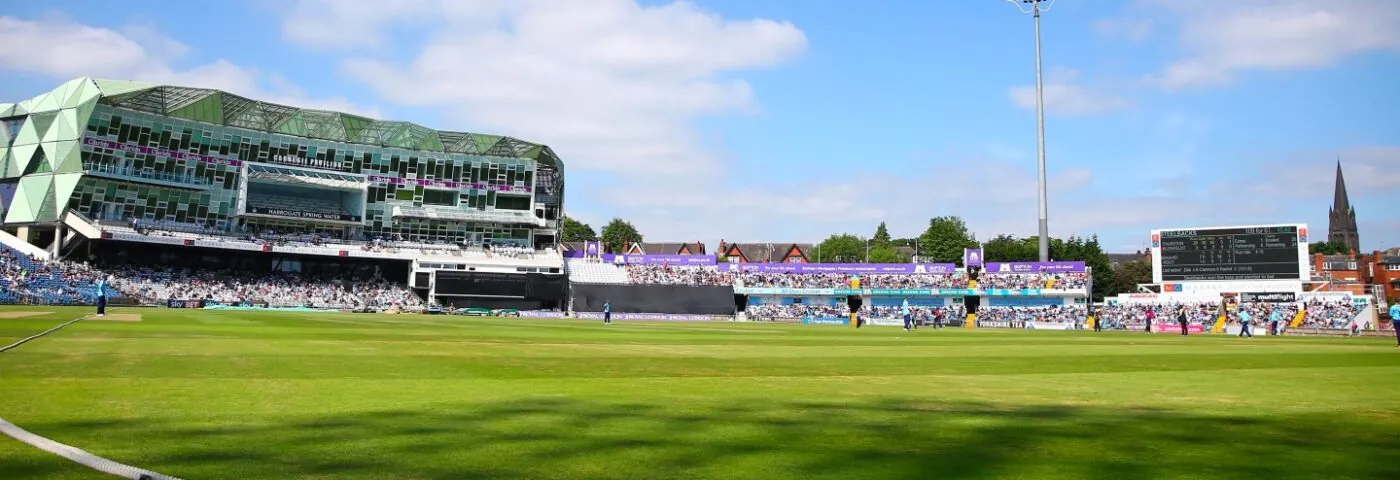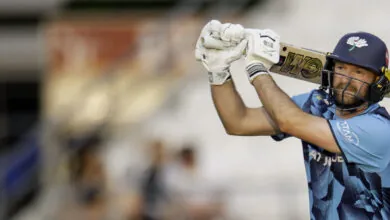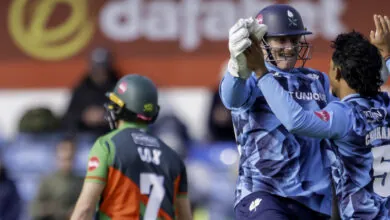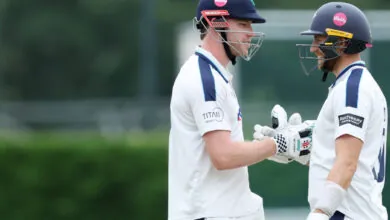Having won the County Championship in both 1966 and 1967, Yorkshire did so again in 1968 to complete its first three-in-a-row since the 1930s. Paul Dyson looks back at the season of half-a-century ago.
The stability of the first-choice team which had first played together in 1963, and was therefore competing in its sixth season together, is manifest in the ten players – Binks, Close, Hampshire, Illingworth, Nicholson, Padgett, Sharpe, Taylor and Wilson – who each played in at least 22 Championship matches in 1968. Richard Hutton (20 games) also had a good run in the side and the only blot on availability was Geoff Boycott appearing in only 10 games due to playing in three Tests against Australia and an unfortunate back injury.
A wet May resulted in five draws and two wins. Each of the victories were by an innings, Boycott scoring a century in both matches, including 180 not out against Warwickshire at Middlesbrough, Ray Illingworth taking six for 44. An indication as to how much the rain curtailed some games is that only 12 wickets fell against Hampshire at Harrogate, only seven at Taunton and only 12 against Sussex at Bradford. Yorkshire had a very narrow escape at Bristol where Mike Procter’s five for 24 left the visitors clinging on at 93 for nine chasing a mere 136. They collapsed to 43 for seven and it was left to Illingworth (45 not out) and Chris Old to face the final 15 balls together to survive. Earlier Boycott had scored his fourth century of the month – no other Yorkshire batsman had scored even one!
June brought Yorkshire’s first defeat of the campaign as well as three more victories and three more drawn matches. The loss came at Edgbaston where Rohan Kanhai and Jim Stewart each scored centuries but the match-winning performance was Tom Cartwright’s seven for 36 in the visitors’ first innings. There were two innings victories, both at Headingley, and Doug Padgett scored a century in each of them. Lancashire lost the traditional bank holiday fixture while Middlese were defeated in two days. Rain returned at the end of the month – it was the entire twentieth century’s third-worst summer – and there was little play in the final two games of June.
Of July’s seven games three were won, two lost and two drawn. Glamorgan’s Don Shepherd bowled Yorkshire out for 101 at Sheffield and Keith Boyce took 11 wickets for Essex at Westcliffe-on-Sea. Geoff Cope extracted revenge on the Weklsh county at Cardiff with match figures of 12 for 116. Phil Sharpe made a century in this match as he did in the innings win over Surrey at The Oval.
The season’s final month brought four more draws, three wins and one defeat. There were two highly dramatic matches. At Worcester the bowlers held sway throughout, the top score of 43 being made by the home side’s Jim Yardley. Yorkshire’s first innings lead of 25 looked significant but their eventual target was 137 in five hours. Things did not look good at 32 for four; wicket-keeper Jimmy Binks held out for 160 minutes but wickets kept falling and the final pair of Trueman and Nicholson needed to score 16 to win. The former survived four lbw appeals as the runs were ticked off but a fifth was decisive and the Championship contenders had lost by one frustrating run. The season’s final game was at Hull where Yorkshire needed to beat Surrey to secure the title. A first innings of over 300 and eventual first innings lead of 138 put Yorkshire safe but they needed to bowl the visitors out on the third day. Younis Ahmed and Arnold Long held them up for 105 minutes but a stroke of luck turned the match when Younis was caught by Binks off skipper Brian Close’s forearm when the latter was fielding at very short leg. Despite now being into the final two overs a run-out and fifth wicket for Don Wilson saw Yorkshire home.
Yorkshire had won the Championship with 14 points to spare over Kent. Although Boycott was top of the batting averages, Sharpe was the leading run-scorer with over 1,100. John Hampshire and Padgett each scored over 900 runs. Wilson was the only bowler to take over 100 wickets and he topped the averages. Illingworth and Nicholson both took over 75 wickets.
Yorkshire played in four other first-class matches during the season and these included a most significant result against the Australians at Sheffield. In the days when matches betweeen the tourists and the counties meant a great deal the visitors put out a very strong side including skipper Bill Lawry, Ian Redpath, Doug Walters, Ian Chappell, Graham McKenzie, Johnny Gleeson and Alan Connolly. With 86 from Boycott and other half-centuries from Padgett and Illingworth, Yorkshire declared on 355 for nine. The pitch ‘gave some, but certainly not excessive help to both fast bowling and slow.’ (Wisden) The weather was hot and humid and Yorkshire’s bowlers took advantage of this in a way that their Australian counterparts had been unable to. The visitors were bundled out for 148, despite 58 from Lawry, and, with a lead of 207 Trueman, leading the side in the absence of Close, enforced the follow-on. The Australians then fared even worse making ten runs fewer, although Walters made 62 and the hosts had won by an innings and 69 runs. Illingworth took four wickets in each innings (8-67) and Trueman three in each innings. The latter always regarded the victory as one of the proudest moments of his entire career. It was the first time Yorkshire had defeated these particular opponents since 1902.
In the Gillette Cup – the only limited-overs competition at that time – Yorkshire lost its first match – to Warwickshire at Edgbaston by four wickets and so were knocked out. In a relatively low-scoring game the crucial innings of 72 was played by the hosts’ Dennis Amiss.
Ken Taylor retired at the end of the season to pursue his career in art as both teacher and practitioner. Illingworth had the nerve to ask for a three-year contract but was refused and so moved to the more accomodating Leicestershire as captaion. Less than a year later he was appointed England skipper. Later in the autumn Trueman announced his retirement. The squad which had won seven Championships in ten seasons had broken up. Several talented players remained and it certainly did not feel like the end of an era. However, 1968 has come to be regarded as exactly that but no one at the time thought that it would be another 33 years before a return to being champions.




